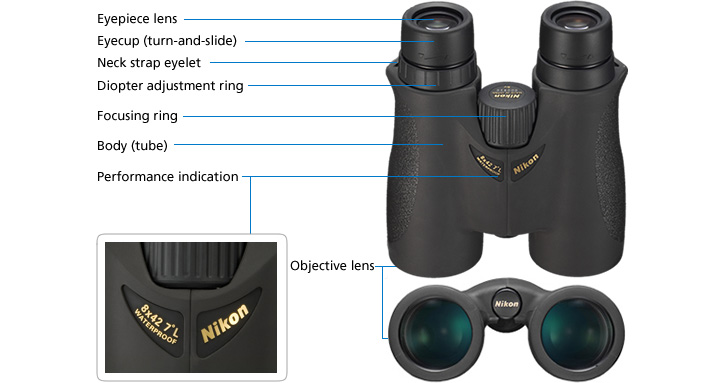How to Use Binoculars How to use CF binoculars / Nomenclature
Once you know how to use binoculars properly, you can experience the full excitement of viewing. Understanding a few simple procedures will ensure your enjoyment. Binoculars are available in two types, according to how they focus: CF (Central Focusing) and IF (Individual Focusing) binoculars.
How to use CF(Central Focusing) binoculars
(1)Adjusting eyecup (turn-and-slide)
For non-eyeglass wearers, eyecups should be set to the fully extended position.
For eyeglass wearers, eyecups should be set to the fully retracted position.
Using the appropriate eyecup position, looking through binoculars from where the exit pupil is formed (eye point), you can obtain the entire field of view without vignetting.
Setting turn-and-slide eyecup
-
<Non-eyeglass wearer>
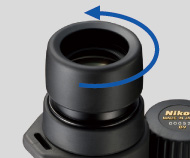
Turn counterclockwise to the fully extended position.
<Eyeglass wearer>
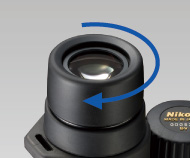
Turn clockwise to the fully retracted position.
Setting rubber eyecup
-
<Non-eyeglass wearer>
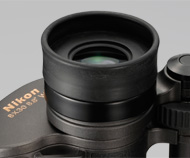
Set the rubber eyecup up.
<Eyeglass wearer>
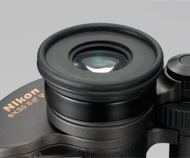
Fold back the rubber eyecup.
(2)Adjusting the distance between the eyepieces to your eyes (Adjusting interpupillary distance)
Interpupillary distance varies among individuals. So adjust the distance of the eyepiece lenses according to your own interpupillary distance.
Hold the binoculars with both hands.
While looking at a distant object, carefully move the binocular tubes downward or upward until left and right fields are correctly aligned, forming a perfect circle.
If the interpupillary distance has not been properly adjusted, the image might be uncomfortable to view.
-
Adjusting interpupillary distance by moving binoculars.
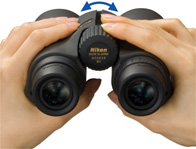
-

The interpupillary distance is not correctly adjusted.
The central part might not be sharp and vignetting might occur at the periphery.
The interpupillary distance is properly adjusted.
When correctly aligned, both fields form a single circle.
- *Photos are simulated viewfinder images.
(3)Adjusting for differences between the sight of each eye (Diopter adjustment)
To look through binoculars with both eyes, you need to perform diopter adjustment. Supposing you have a different visual acuity between left and right eyes, if you look though binoculars without doing this, you will not see sharp, crisp images because one eye will see objects in focus while the other does not. And worse still, you will suffer eye fatigue.
Usually, adjust the diopter of your left eye first, then your right eye.
-
Focus with your left eye by focusing ring.
Then, focus with your right eye with diopter adjustment ring on the right eyepiece.
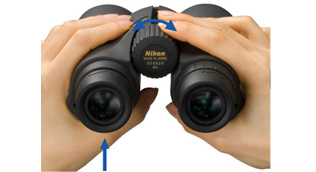
Look at an object through the left eyepiece with your left eye. Rotate the focusing ring until you see a sharp image of it.
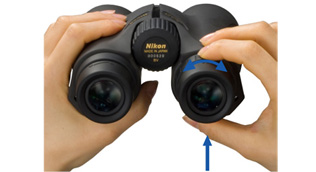
Look at the same object through the right eyepiece with your right eye.
Rotate the diopter adjustment ring (usually located on the right eyepiece) until you see a sharp image.
- *If the diopter adjustment is located on the left eyepiece, follow the procedure above in reverse order.
- *If you use zoom binoculars, set them at the maximum magnification first. Then focus with the diopter adjustment ring.
(4)Focus with focusing ring
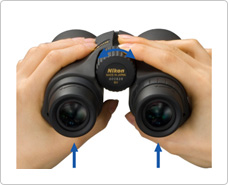
Focus on an object by rotating the focusing ring. If the diopter has been adjusted, turn the focusing ring to focus whenever you change the object viewed.

